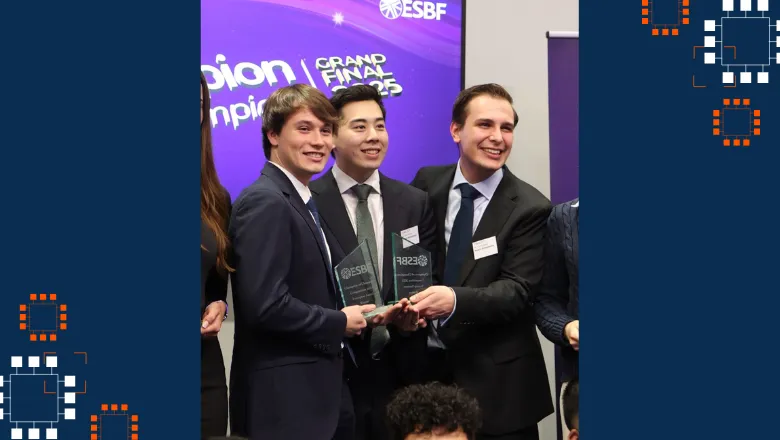A team of PhD students from King's College London has won two prizes in the 2025 Engineers and Scientists in Business Fellowship (ESBF) 'Champion of Champions' competition.

A team of PhD students from King's College London has won two prizes in the 2025 Engineers and Scientists in Business Fellowship (ESBF) 'Champion of Champions' competition.
The team, known as PEACH Simulators, took home both the prestigious Enterprise Award and the Startup prize, winning a total of £8,000. PEACH Simulators comprises PhD students Zixi Wang, Steven Morris and Carlo Saija, and Dr Antonia Pontiki and Professor Kawal Rhode, all from King's School of Biomedical Engineering & Imaging Sciences.
Their award-winning innovation is a series of partly reusable medical-training models that simulate human anatomy and surgical procedures. The models aim to make medical training and testing more realistic and accessible, addressing the high cost, ethical challenges and logistical hurdles of traditional cadaver- and animal-based training and tech validation.
Constructed from soft materials that mimic human tissue, the models allow doctors, students, trainees, and researchers to practice in a safe, realistic and repeatable way. So far, the team has developed thoracic, cardiovascular, ear, nose and throat, and urology simulators.
The models are up to 80 per cent cheaper than cadaver or animal models, and because they are partly reusable and portable, they could help the NHS and universities save millions while improving access to hands-on surgical training and experimentation.
The annual ESBF competition offers engineering and science students a platform to showcase their innovations on a national stage. The 2025 event - which saw almost double the number of entries of the previous year - was held at the Royal Academy of Engineering on 6-7 November 2025, with 10 university teams competing for a share of the £17,000 prize fund, mentorship and business support opportunities.
PEACH Simulators took part in the 2024 King's MedTech Accelerator, a programme at the London Institute for Healthcare Engineering (LIHE) supporting King's College London and King's Health Partners researchers to transform their research innovations into viable healthcare ventures.
It is no surprise that the ecosystem created at King's has helped our students to excel and become innovators and competition winners. The combination of the outstanding education offered by our School, the entrepreneurship and innovation guidance offered by LIHE, and the clinical expertise offered by Guys and St Thomas' and King's College Hospital has truly been a golden triangle.
Kawal Rhode, Professor in Biomedical Engineering and the Head of Education at the School of Biomedical Engineering & Imaging Sciences
Next, the team plans to officially spin out PEACH Simulators from King's, raise seed funding, and begin supplying their models to King's Health Partners, other UK hospital trusts, medical associations and MedTech companies. In the longer term, they hope to expand internationally, making affordable, reusable surgical training models accessible worldwide, including low-resource settings where access to traditional training methods remains limited.
We are so grateful for all the opportunities, mentoring and inspiration that King's provides. Our university's nurturing and encouraging environment made this possible. We look forward to making medical training and scientific advancement more ethical and accessible to all our peers in medicine.
Carlo Saija, PhD student at the School of Biomedical Engineering & Imaging Sciences






